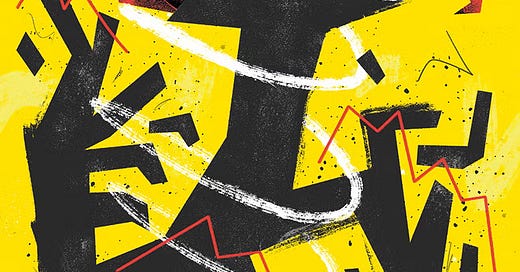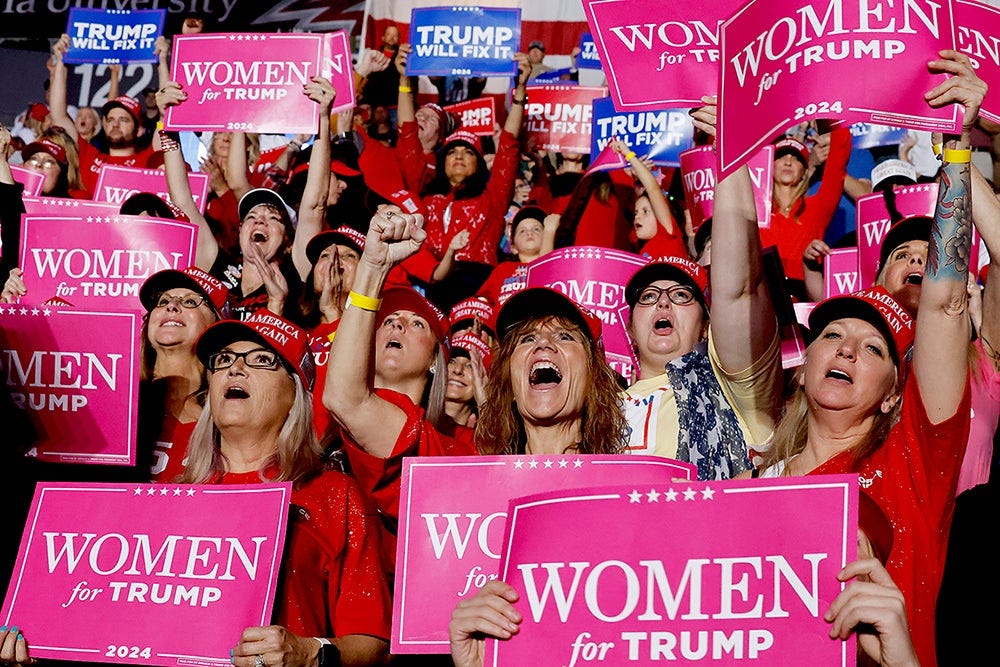The Saturday Read: Ruptures with the past
Inside: Donald Trump, Musk, Nick Cave, Rachel Cusk and the Goldsmiths Prize, Germany in crisis, and Andrew Marr's advice for Keir Starmer.
Good morning. Welcome to the Saturday Read, the New Statesman’s guide to politics, culture, books, and ideas. This is Jason, together with Finn, Nicholas, Pippa and George.
As I wrote in these notes last week, Kamala Harris was the ideal candidate for Donald Trump: an ultra-liberal West Coast lawyer with a rictus smile and an undistinguished record as vice-president. She smiled and laughed a lot during the campaign, she preached progressive orthodoxies, she shared platforms with Oprah Winfrey, Beyoncé and Lady Gaga, as if the support of the moneyed showbiz elite could persuade provincial, working-class America to vote for the Democrats. The truth is she had nothing to say to the mass of Americans disillusioned by economic hardship, alarmed by immigration and the porous southern border, and alienated by identity liberalism. They do not share Harris’s priorities and are weary of being ignored, preached at, talked down to by the coastal elites.
Stealing a line from Labour, the Democrats said they wanted to put country before party. But the high command around Joe Biden and Kamala Harris – who, in effect, came last in the 2020 presidential primaries – put themselves first. The recriminations are bitter and the blame game has begun.
One argument is that, because of Biden’s stubborn desire for a second term even as he became increasingly incoherent, Harris was not given enough time to introduce herself to the American people. But she was the “incumbent”. She was, and remains, Vice-President of the United States. Her campaign raised as much as $1 billion and out-spent Trump’s. This is what the New York Times said about Harris in November 2019: “Ms Harris is the only 2020 Democrat who has fallen hard out of the top tier of candidates. She has proved to be an uneven campaigner who changes her message and tactics to little effect and has a staff torn into factions.” The paper endorsed her in 2024.
Trump has won a crushing victory and is free to remake America in his own image. (We will analyse what his victory means for Russia/Ukraine, China/Taiwan, Europe and Nato in the next issue of the magazine.) He may be a billionaire huckster – a convicted felon, a braggart, a liar etc, etc – but he never speaks down to working class America. The message of the Maga movement may be deluded but it is ultimately optimistic: We can be great again! Really – let’s see how he goes second time around.
Instead of simply denouncing Trump as a “fascist” as Harris did in the final days of the campaign, liberals should attempt to understand what he represents and the forces he has unlocked and channels. Grapple with the world as it is not as you wish it to be or once knew it. There is not much evidence that will happen.
May I end by thanking our US politics team – Katie Stallard, Freddie Hayward, Jill Filipovic, and Sohrab Ahmari – and our international editor, Megan Gibson, for their excellent coverage of the US election over recent days and weeks. Enjoy the weekend.
The picks…
Good morning, Finn here. We hope you enjoyed our election special newsletter on Wednesday. There’s plenty more on Trump, Harris and the feted American realignment below. But the world continues to revolve even when the US goes to the polls: Nicholas went to Southport, three months on from the riots; Pippa saw Nick Cave in concert; and Wolfgang dives in the deep end of Germany’s political crisis.
George is away in Washington DC for this rather momentous week, so we asked our colleague, policy correspondent Megan Kenyon, to fill in for Best of the Rest. Our literary editor Tom Gatti also joins us to talk about the Goldsmiths Prize. As ever, thanks for reading and have a great weekend.
1—“It wasn’t even close.”
Economic hardship fuelled Donald Trump’s historic return to the White House, Katie wrote in the immediate aftermath of the US election. Because of this, millions of Americans were willing to overlook the less palatable elements of Trump’s behaviour to vote for the man they believe will save their country. PB
One supporter at the rally, 60-year-old Joe Jackson, told me, “All [Harris] is running on is Trump and the idea that all of us are deplorable garbage,” as he stood beside a white garbage truck with a life-sized cut-out of the former president and a sign that read: “Garbage deplorables for Trump”. Behind us, someone shouted proudly, “I’m trailer trash!” People queued up to take their photograph alongside Trump, fists raised in an imitation of his defiant gesture after the assassination attempt, repeating his mantra: “Fight, fight, fight.” “I love being garbage,” Jackson continued. I asked him if he genuinely believed Harris thought that about him. “Yes, she’s always felt like that,” he replied. “That’s just the way Democrats are.”
2—“The rage of England.”
The stabbing of three little girls in Southport on 29 July triggered the worst wave of civil unrest England had seen for 13 years. Three months on, I reported from the sites of the worst violence: Southport, Walton in north Liverpool and Wath-upon-Dearne, near Rotherham. NH
Though most of the revolts took place in left-behind England, long marginalised and ravaged by austerity, we cannot put this down to economic anxiety alone. The insertion of asylum seekers into these withered communities, dependent on the state until their migration status is assessed, has transfigured a sense of mere deprivation into new impulses, racialised and fatalistic. After all, the same state has neglected places like Wath and Walton for generations, in much the way that in the early 1980s Geoffrey Howe sentenced the whole of Liverpool to “managed decline”. A heavy pall of spite and aggression has set in across England’s suburbs and satellite towns, the perfect oxygen for racism and ethnic-sectarian conflict.
3—“Germany’s delusions.”
Had you noticed that the German government has collapsed? Wolfgang Münchau unpicked the political crisis on our website. But the news came as no surprise: in this week’s magazine, Wolfgang gave the long view on how Germany became the sick man of the continent it used to rule. NH
Comparing Germany’s industrial decline to the five stages of grief, the country can be seen to have been stuck in the first stage – denial – for a very long time. But now Germany is transitioning to the second phase: anger. This is the stage in which factories close and jobs go, and where everybody blames one another – with particular blame reserved for the EU. Brexit, too, was preceded by decades of verbal and written abuse directed at the EU. I am not predicting a German exit from the EU, but I see progressive disengagement. People blame EU regulation; Scholz is blaming EU tariffs.
4—“Selling the future.”
How did Elon Musk become so influential? It all started because he has a unique ability to command the respect of the markets, Will Dunn writes. And so long as he can tell a convincing story, his influence will persist. FMcR
Trump – who referred to Musk in his victory speech as a “super genius” – has offered Musk a position in his new administration. The role in a yet-to-be-formed “Department of Government Efficiency” may involve cutting large numbers of government jobs. Musk is a friend of the Argentinian president, Javier Milei, whose programme of extreme austerity (in which 70,000 public employees could lost their jobs) he admires. Musk has already told investors that he plans to introduce faster regulation – or remove it – where it impedes the progress of self-driving cars. The huge overnight jump in Musk’s wealth is thanks to market participants seeing his new capacity to make good on this promise, and allocating capital accordingly.
5—“A furious indictment.”
Freddie has put in some heroic shifts for us over election week. My favourite piece is his dispatch from Kamala Harris’s concession speech at Howard University. Will the party learn from its litany of tactical, rhetorical and spiritual mistakes? Freddie is not so optimistic. FMcR
Her concession speech was a sign that the party elite will plough on as before, unreflective about the distance between themselves and large swathes of the electorate. After the crowds started streaming out of the gates back towards the centre of Washington, one man cheerily remarked to a friend, “You know, I remember that Hillary also gave an awesome concession speech in 2016.”
To enjoy our latest analysis of politics, news and events, in addition to world-class literary and cultural reviews, click here to subscribe to the New Statesman. You'll enjoy all of the New Statesman's online content, ad-free podcasts and invitations to NS events.
In 2013, as the Booker Prize suffered an identity crisis and British literary culture felt increasingly adrift, the Goldsmiths Prize was born. Co-founded by Goldsmiths University and the New Statesman, it set out to reward novels from Britain and Ireland that “break the mould or extend the possibilities of the form”. Its first winner, Eimear McBride’s A Girl is a Half-formed Thing, had been rejected by all the UK’s major publishers – and went on to be considered a modern classic.
This year’s prize winner is Rachel Cusk for Parade. Cusk is known for her coolly intelligent style, most evident in her Outline trilogy, which is credited with kick-starting the recent trend for “autofiction”. Parade features visual artists based on real figures as it blends essay, fiction and biography.
“I do get the impression that women are writing more boldly and radically about female experience in this moment,” Cusk told the New Statesman earlier this week. Accepting her award in London on Wednesday, she said: “I’ve got where I’ve got by not winning prizes, and by not being given that flattery and recognition. But it’s still quite nice to win one – especially one that stands for something.”
6—“From Hell to Heaven.”
At the heart of John Milton’s biblical epic, Paradise Lost, is a tension between rebellion and order, demon and angel, protagonist and antagonist. Reviewing a new study of Paradise Lost’s political afterlife, Lucy Hughes-Hallett finds this tension has led all sorts to seek moral legitimacy in the poem. NH
In Milton’s account, God the Son takes a pair of golden compasses and draws a circle containing the universe “and all created things”. Within this circle all is order, light and beauty – “the black tartareous cold infernal dregs” having been drained off into the surrounding Chaos. This vision of a world purged of blackness was read by white supremacists such as the Krewe members, as “an idealised vision of racial segregation”... Move into the next century and, handy-dandy, the devils and the heavenly host have swapped places again. To Malcolm X, reading Paradise Lost in the prison library in Massachusetts in 1948, it is not black people who are like the fallen angels, the black “dregs”, but their enslavers.
7—“Increasingly incompatible values.”
There has long been a gender split when it comes to voting intentions. But the growing chasm between young men in America and young women is serious news. Plenty has been said on where the divide came from; Hannah Barnes asks what it means for the future of the family. FMcR
The election of Trump will have many consequences. But the realisation of Vice-President elect JD Vance’s vision of the family will not be one of them. There can be no incentivising couples to have more children when men and women have increasingly incompatible values. Relationships won’t start; and staying together for the kids makes no sense when there are no kids to speak of. Maybe these Gen-Z women who want children will turn to another route to become mothers: holding Trump to his promise for support for IVF. Far from the Republican victory heralding a new era of family-first policies, it looks increasingly likely there will be fewer of the traditional families they yearn for.
8—“Completely and incorrectly convinced.”
In Anora, Sean Baker’s Palme D’Or-winning film, the eponymous sex-worker has a whirlwind “romance” with a client; they marry swiftly, and just as swiftly everything falls apart. Megan Nolan found herself moved by Anora’s youthful ability to talk herself into believing the fantasy – “a skill we mostly lose in later adulthood”. PB
What follows is broadly comic, but overshadowed by the discomfort of the viewer, who knows all too well what violence is usually meted out to beautiful young sex workers on-screen. For a good 30 minutes, Ani is confined to a living room with a hired heavy of deceptive gentleness named Igor, instructed by his bosses to keep her there. While he does everything in his power to get her to keep still without physically harming her, she understandably lashes out, landing a surprisingly solid punch, biting his neck, breaking the nose of another man. It’s funny and wild and chaotic, but it functions as more than just slapstick thanks to intolerable tension of we feel, wondering if and when they will seriously hurt her.
9—“In total control.”
Last weekend I headed up to Leeds, my university city, to see Nick Cave 14 years after I first saw him live in concert during fresher’s week. It has become a cliché to describe his work as “transcendental”, but it is: the music lay heavy over the audience, and it was hard, by the end, not to feel a little closer to God. PB
It is hard to imagine that anyone doesn’t know the name Nick Cave. Now in his mid-sixties, Cave is as prolific, mesmeric and original as he was when the Bad Seeds formed in the Eighties. Over the decades, their music has progressed from gnarly, gothic rock to something more generous and reflective, intensified in recent years by the deaths of two of Cave’s sons. The darkness remains but it is suffused by joy, a happiness only possible because of intimacy with pain.
10—“Thin-ice politics.”
When possible, Britain likes to differentiate itself from American politics, with its insurrections, its baseball hats, its paranoid style. But we have more in common than we’d like to think. Andrew Marr offers some words of advice to Keir Starmer and Kemi Badenoch, two party leaders trying to navigate this treacherous era. NH
We are not immune here in the UK. The easy politics of division catches our attention too, and always has done. It wakes up in the morning furious and sends us to bed at night, livid. Peddling it – from the extreme left as well as from the right – is a quicker route to political celebrity than the grind of policy. It may be where we are inevitably heading. The deterioration happens not in leaps or at cataclysmic elections – they are just the final pages – but, like bankruptcy, slowly at first. It’s initially about the choice of words – liar, evil, Nazi, communist – and a half-conscious decision not to listen to unwelcome alternative voices; and those choices may feel refreshing at the time. But one small thing: as we glance west, it is becoming ever clearer that conspiracy, loathing and division are also, step by step, democracy’s primrose path to civilisational suicide.
Megan’s Best of the Rest
Alan Jacobs: Auden’s Island
Noah McCormack: Jessica Mitford’s escape from fascism
Malcolm Gaskill: Fireworks!
Paul Franz: The many forms of Rachel Cusk
Helen Rumbelow: She’s back! Inside the mind of Melania Trump
Lynn Steger Strong: Reading “King Lear” during hurricane season
David Brooks: Donald Trump jumped into the class war
Monkeys will never type Shakespeare, study finds. Not with that attitude!
And with that…
Will the energy behind Trump’s victory cross the Atlantic? When I covered Reform’s party conference in September, I spotted the occasional Maga hat in the crowd. There is a sneaking admiration for the American right among the younger Conservative activists too. They enjoy Trump’s “based” vulgarity, and they draw ideological inspiration from both the Peter Thiel-backed “New Right” and the Christian nationalism of the National Conservatism movement. They like these figures’ apocalyptic tenor, their shock libertarianism and the fact that, in America, they are not only fighting a war on “woke” but appear to be winning it.
I think both Reform and the Conservatives should be wary of letting this admiration become imitation. In recent years, we have seen the activist left in Britain far too ready to take its cues from American progressives: critical race theory applied to Leicester and Brixton. But “this is not America”, as Tomiwa Owolade so memorably argued at the time. This talk alienated ordinary voters. The same will go on the right too. The preoccupations of Maga – IQ, cultural Marxism, Curtis Yarvin’s Substack – are as alien to the Tory shires as “whiteness studies” was to the Red Wall. An intelligent revival of the British right will come from within its own traditions, not from any import business.
— Nicholas
The New Statesman is home to the finest writing on politics, culture and ideas. To stay up to date, subscribe using the link above.



















Thank you very much for featuring my article on Rachel Cusk; it was a particular treat have it to appear alongside Anna Leszkiewicz's fine interview.
Enjoy this read - but reading the article about Jessica Mitford, I was disappointed in the inaccuracy. The writer states that “ the brother, like Branwell Brontë, merits no consideration” and yet the sixth sister - the second daughter, Pamela - is written out of the article completely. As the most rural and least political of the sisters, she doesn’t excite the same commentary but she at least deserves to be counted amongst their number. After all, she owned an Aga that matched her beautiful eyes.